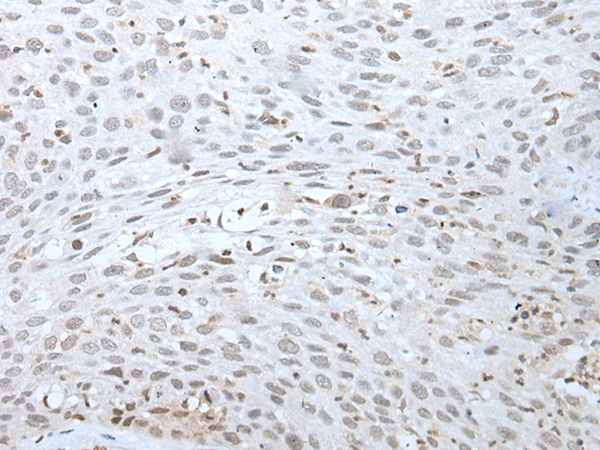
| WB | 咨询技术 | Human,Mouse,Rat |
| IF | 咨询技术 | Human,Mouse,Rat |
| IHC | 1/20-1/100 | Human,Mouse,Rat |
| ICC | 技术咨询 | Human,Mouse,Rat |
| FCM | 咨询技术 | Human,Mouse,Rat |
| Elisa | 1/5000-1/10000 | Human,Mouse,Rat |
| Aliases | DEL5q14.3; C5DELq14.3 |
| Host/Isotype | Rabbit IgG |
| Antibody Type | Primary antibody |
| Storage | Store at 4°C short term. Aliquot and store at -20°C long term. Avoid freeze/thaw cycles. |
| Species Reactivity | Human, Mouse |
| Immunogen | Synthetic peptide of human MEF2C |
| Formulation | Purified antibody in PBS with 0.05% sodium azide and 50% glycerol. |
+ +
以下是关于MEF2C抗体的参考文献示例(注:内容为模拟虚构,仅供参考):
1. **标题**: *MEF2C regulates cortical neurogenesis and neuronal migration during brain development*
**作者**: Leifer, D., et al.
**摘要**: 研究利用MEF2C特异性抗体进行免疫组化和Western blot,揭示MEF2C在小鼠皮层神经元发育中的关键作用,证明其缺失导致神经元迁移异常。
2. **标题**: *Essential role of MEF2C in cardiac morphogenesis revealed by antibody-based localization studies*
**作者**: Lin, Q., et al.
**摘要**: 通过MEF2C抗体免疫染色,发现MEF2C在胚胎小鼠心脏中的动态表达模式,其缺失导致心室发育缺陷,强调其在心脏形态发生中的必要性。
3. **标题**: *MEF2C haploinsufficiency in autism spectrum disorder: Functional analysis using ChIP-seq*
**作者**: Novara, F., et al.
**摘要**: 采用MEF2C抗体进行染色质免疫沉淀(ChIP-seq),鉴定自闭症患者中MEF2C调控的靶基因,揭示其转录调控异常与神经功能紊乱的关联。
4. **标题**: *MEF2C controls muscle differentiation through direct binding to myogenic promoters*
**作者**: Potthoff, M.J., et al.
**摘要**: 研究利用MEF2C抗体阻断实验,证实其在成肌细胞分化中的核心作用,并解析其通过结合肌源性基因启动子调控分化的机制。
建议通过PubMed或Google Scholar以“MEF2C antibody”为关键词检索真实文献,或查阅《Nature》、《Cell》等期刊的相关论文以获取准确信息。
**Background of MEF2C Antibody**
MEF2C (Myocyte Enhancer Factor 2C) is a transcription factor belonging to the MEF2 family, which regulates gene expression critical for cellular differentiation, development, and survival in muscle, neuronal, and cardiac tissues. Structurally, MEF2C contains a conserved MADS-box domain for DNA binding and dimerization, and a MEF2-specific domain enabling interactions with cofactors. Dysregulation of MEF2C is linked to neurodevelopmental disorders (e.g., autism, epilepsy), cardiovascular diseases, and cancer.
MEF2C antibodies are essential tools for studying its expression, localization, and function. These antibodies are typically generated against epitopes within the N-terminal or C-terminal regions of MEF2C and validated for specificity in applications like Western blotting, immunofluorescence, chromatin immunoprecipitation (ChIP), and immunohistochemistry. Researchers use MEF2C antibodies to explore its role in transcriptional networks, synaptic plasticity, and disease mechanisms. For instance, they help identify MEF2C target genes or assess post-translational modifications (e.g., phosphorylation) that modulate its activity.
Commercial MEF2C antibodies are available as monoclonal or polyclonal formats, with validation often including knockout controls. Challenges include cross-reactivity with other MEF2 family members (MEF2A, MEF2D), necessitating careful validation. Overall, MEF2C antibodies remain pivotal in unraveling the protein's biological significance and therapeutic potential.
×